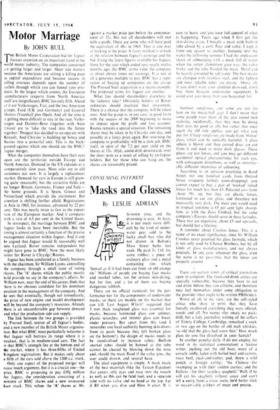Masks and Glasses
CONSUMING INTEREST
By LESLIE ADRIAN
SUMMER time, and the drowning is easy. At least, it is not made more cult by the kind of under-
some rubber, a piece of ordinary glass and a metal containing rim which 'looked as if it had been cut from an old orange tin.' Millions of people are buying face masks and snorkel tubes, not for serious skin-diving, but for fun, and a lot of them are buying dangerous rubbish.
There are no official standards for the per- formance nor for the components of underwater masks, so there are models on the market that can kill. Last August Which? suggested that 3 mm thick toughened glass was essential for masks, because laminated glass can splinter, plastic scratches, and thinner glass can break under pressure. But apart from this (and I remember one local authority banning skin-divers from its pools because they left broken glass on the bottom!), the design of masks needs to be standardised to increase safety. Built-in snorkel tubes should be banned as the tube cannot be cleared by blowing down the nose and, should the mask flood if the valve goes, the user could drown, and several have.
The ideal equipment is simple. A mask made of the best materials (like the Tarzan Espadon) that covers only eyes and nose (not the mouth as well, as this can be fatal too), and a separate tube with no salve and no bend at the lop. Let it fill when you dive and blow it clear. It is easy to learn, and you have full control of what is happening. Years ago when I first got the skin-diving craze, 1 bought a mask with built-in tube closed by a cork float and valve. I kept it from one season to another. Jumping into the ater the following summer I had the unpleasant shock of submerging with a mask full of water when the rotten aluminium gave way, the valse broke and the tube flooded the mask. Metal can be heavily corroded by salt water. The best masks are clamped with stainless steel, and the lightest and most reliable tubes are plastic. Above all, if you don't want your children drowned, don't buy them bargain underwater equipment. It could cost you more than vou bargained for.
Summer sunglasses, and some are not (to lean on the music-hall gag). I don't mean that some people wear them all the year round (not realising, incidentally, that they may be doing their eyes no good at all), but rather that once again the old rule applies. you get what you pay for. Cheap sunglasses are made from 'blown' glass, which can be optically harmful. A glass sphere is blown and then curved discs are cut from it and used to make dark glasses. These pieces are not lenses, and you may get different accidental optical characteristics for each eye, with consequent distortions, as well as unnotice- ably different intensities of colouring.
According to an optician practising in Bond Street, not one hundred yards from Oxford Street (etiquette forbids name-dropping), you cannot expect to buy a pair of 'worked' tinted lenses for .much less than £3. Polaroid cosi from about 50s. up, but they are plastic lenses,. laminated to cut out glare, and therefore not necessarily very dark. The most you would need in tropical sunshine is 65 per cent light absorp- tion, as with the Zeiss Umbra!, but the same company's Europa should serve in these latitudes. These two are expensive, about £5 and upwards, but should last a lifetime.
A reminder about Crookes lenses. This is a name of no exact significance, since Sir William Crookes never patented his glass formula, which is not only used by Chance Brothers, but by all kinds of glass manufacturers, and not always precisely. In any case, whatever the glass, even the name is no guarantee that the lenses are properly ground.
1-
There are certain kinds of critical journalism open to criticism. The food-and-drink critics are specially vulnerable, because they have to eat and drink before they can criticise, and therefore may feel themselves under some obligation to the provider (that ought to be written PROvider).
Worst of all, in my view, arc the self-styled critics who show in print that they have literally swallowed everything they were offered, words and all. No names (for once), no pack- drill, but a lady journalist, writing of the cellars of Trinity College, Cambridge, remarked a week or two ago on the bottles of old malt whiskies, `so old that the glass had worn thin.' How much glass do you like dissolved in your Scotch?
In another popular daily (I do not employ the word in its statistical connotation) a feature writer. pushing out the old boat, more of a coracle realty, laden with boiled beef and carrots, roast beef, steak-and-kidney pud, threw a wild punch at foreign eating: 'the Chinese—for swamping us with their sodden curries; and the Italians—for their tasteless spaghetti.' Well, if he will eat his spaghetti without sauce and can't tell a curry. from a chow mein, he'd better stick to recognisable gobbets of meat and potato.






























 Previous page
Previous page